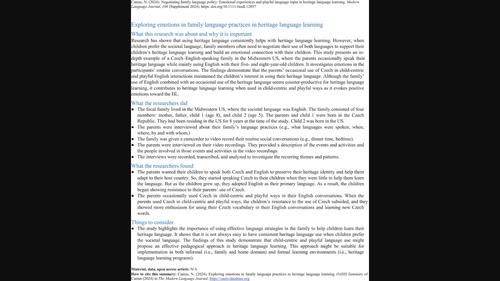当前位置:
X-MOL 学术
›
Mod. Lang. J.
›
论文详情
Our official English website, www.x-mol.net, welcomes your
feedback! (Note: you will need to create a separate account there.)
Negotiating family language policy: Emotional experiences and playful language input in heritage language learning
The Modern Language Journal ( IF 4.7 ) Pub Date : 2024-01-24 , DOI: 10.1111/modl.12897 Nermin Cantas 1
The Modern Language Journal ( IF 4.7 ) Pub Date : 2024-01-24 , DOI: 10.1111/modl.12897 Nermin Cantas 1
Affiliation

|
Heritage language (HL) learning is often facilitated by consistent exposure to the HL in family language policy (FLP). However, when children develop a preference for the majority language, family members may negotiate their use of both languages to establish a stronger emotional bond with their children while providing rich HL input. This article presents a case study of a Czech–English-speaking family in the Midwestern United States, focusing on the parents’ sporadic use of their HL during mainly English interactions with their 5- and 8-year-old children. Drawing on Vygotsky's concept of perezhivanie as the theoretical framework and considering emotions as cultural and discursive constructs, this article uses discourse analytic methods to examine emotions in the participants’ routine social interactions. The findings suggest that even though the parents’ use of English combined with sporadic HL input may seem counterproductive for the children's HL learning, it may still contribute to their HL development when the HL is used in child-centric and playful ways. This study has pedagogical implications for understanding the value of playful HL input in promoting HL learning. Additionally, it proposes theoretical advancements in the study of emotions in second language acquisition (SLA) by demonstrating how Vygotsky's notion of perezhivanie can be utilized to investigate the role of emotions in second language learning.
中文翻译:

协商家庭语言政策:遗产语言学习中的情感体验和有趣的语言输入
家庭语言政策 (FLP) 中持续接触 HL 往往有助于传统语言 (HL) 学习。然而,当孩子对大多数语言产生偏好时,家庭成员可以协商使用两种语言,以便与孩子建立更牢固的情感纽带,同时提供丰富的 HL 输入。本文介绍了美国中西部一个捷克语-英语家庭的案例研究,重点关注父母在与 5 岁和 8 岁孩子主要用英语互动时偶尔使用 HL 的情况。本文以维果茨基的“perezhivanie”概念为理论框架,将情感视为文化和话语结构,运用话语分析方法来考察参与者日常社交互动中的情感。研究结果表明,尽管父母使用英语与零星的 HL 输入相结合似乎对孩子的 HL 学习起反作用,但当以孩子为中心和有趣的方式使用 HL 时,它仍然可能有助于他们的 HL 发展。这项研究对于理解有趣的 HL 输入对于促进 HL 学习的价值具有教学意义。此外,它通过展示如何利用维果茨基的Perezhivanie概念来研究情感在第二语言学习中的作用,提出了第二语言习得 (SLA) 中情感研究的理论进展。
更新日期:2024-01-24
中文翻译:

协商家庭语言政策:遗产语言学习中的情感体验和有趣的语言输入
家庭语言政策 (FLP) 中持续接触 HL 往往有助于传统语言 (HL) 学习。然而,当孩子对大多数语言产生偏好时,家庭成员可以协商使用两种语言,以便与孩子建立更牢固的情感纽带,同时提供丰富的 HL 输入。本文介绍了美国中西部一个捷克语-英语家庭的案例研究,重点关注父母在与 5 岁和 8 岁孩子主要用英语互动时偶尔使用 HL 的情况。本文以维果茨基的“perezhivanie”概念为理论框架,将情感视为文化和话语结构,运用话语分析方法来考察参与者日常社交互动中的情感。研究结果表明,尽管父母使用英语与零星的 HL 输入相结合似乎对孩子的 HL 学习起反作用,但当以孩子为中心和有趣的方式使用 HL 时,它仍然可能有助于他们的 HL 发展。这项研究对于理解有趣的 HL 输入对于促进 HL 学习的价值具有教学意义。此外,它通过展示如何利用维果茨基的Perezhivanie概念来研究情感在第二语言学习中的作用,提出了第二语言习得 (SLA) 中情感研究的理论进展。































 京公网安备 11010802027423号
京公网安备 11010802027423号